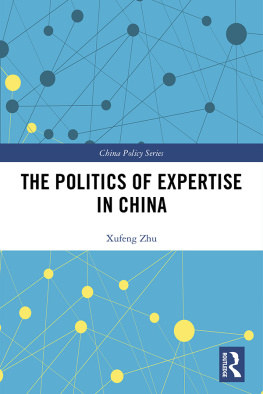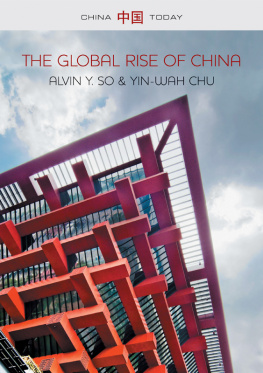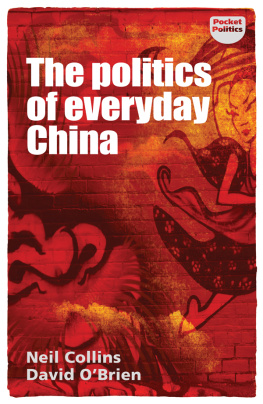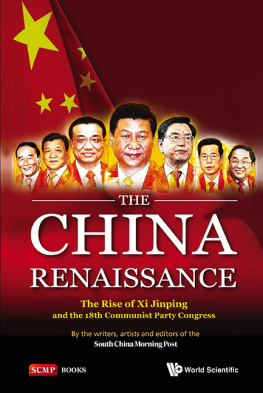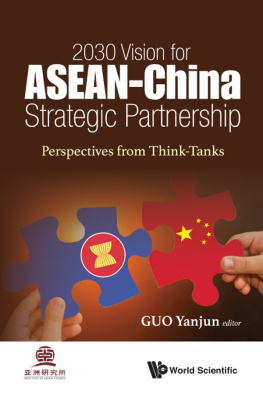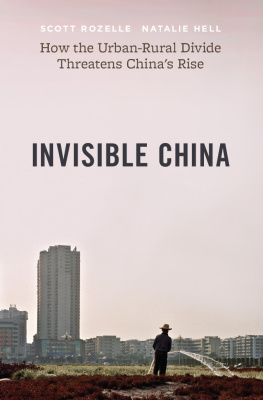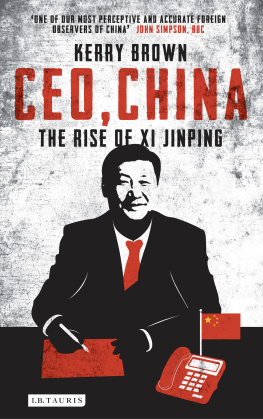The Rise of Think Tanks in China
Despite continuing criticism of the Chinese authoritarian political system, the range of participants in the decision-making process has widened, with different social actors now playing an increasingly important role in the Chinese policy-making process. Accordingly, the role of think tanks in the policymaking process has generated great interest within and outside China. This book explores the behavior and influence of Chinas think tanks and explains the reasons and social consequences of the rise of think tanks in China.
This book raises several questions on the topic: How did think tanks emerge in China? What are the essential factors that determine think tanks in terms of building their governmental and personal networks? How do think tanks work and build their influence in the Chinese policy process? What happens to Chinese society when think tanks become important policy participants in the policy process? The book goes on to discuss new perspectives on policy processes and elite politics in China, and empirically, with comparative case study and data from nationwide questionnaire surveys, it provides a comprehensive picture of think tanks in the current political system of the country.
Xufeng Zhu is Professor in the Zhou Enlai School of Government at Nankai University, China.
China Policy Series
Series Editor: Zheng Yongnian
China Policy Institute, University of Nottingham, UK
1. China and the New International Order
Edited by Wang Gungwu and Zheng Yongnian
2. Chinas Opening Society
The non-state sector and governance
Edited by Zheng Yongnian and Joseph Fewsmith
3. Zhao Ziyang and Chinas Political Future
Edited by Guoguang Wu and Helen Lansdowne
4. HainanState, Society, and Business in a Chinese Province
Kjeld Erik Brodsgaard
5. Non-Governmental Organizations in China
The rise of dependent autonomy Yiyi Lu
6. Power and Sustainability of the Chinese State
Edited by Keun Lee, Joon-Han Kim and Wing Thye Woo
7. Chinas Information and Communications Technology Revolution
Social changes and state responses
Edited by Xiaoling Zhang and Yongnian Zheng
8. Socialist China, Capitalist China
Social tension and political adaptation under economic globalisation
Edited by Guoguang Wu and Helen Lansdowne
9. Environmental Activism in China
Lei Xei
10. Chinas Rise in the World ICT Industry
Industrial strategies and the catch-up development model
Lutao Ning
11. Chinas Local Administration
Traditions and changes in the sub-national hierarchy
Edited by Jae-Ho Chung and Tao-Chiu Lam
12. The Chinese Communist Party as Organizational Emperor
Culture, reproduction and transformation
Zheng Yongian
13. Chinas Trade UnionsHow Autonomous Are They?
Masaharu Hishida, Kazuko Kojima, Tomoaki Ishii and Jian Qiao
14. Legitimating the Chinese Communist Party since Tiananmen
A critical analysis of the stability discourse
Peter Sandby-Thomas
15. China and International Relations
The Chinese view and the contribution of Wang Gungwu
Zheng Yongnian
16. The Challenge of Labour in China
Strikes and the changing labour regime in global factories
Chris King-chi Chan
17. The Impact of Chinas 1989 Tiananmen Massacre
Edited by Jean-Philippe Bja
18. The Institutional Dynamics of Chinas Great Transformation
Edited by Xiaoming Huang
19. Higher Education in Contemporary China
Beyond expansion
Edited by W. John Morgan and Bin Wu
20. Chinas Crisis Management
Edited by Jae Ho Chung
21. China Engages Global Governance
A new world order in the making?
Gerald Chan, Pak K. Lee and Lai-Ha Chan
22. Political Culture and Participation in Rural China
Yang Zhong
23. Chinas Soft Power and International Relations
Hongyi Lai and Yiyi Lu
24. Chinas Climate Policy
CHEN Gang
25. Chinese SocietyChange and Transformation
Edited by Li Peilin
26. Chinas Challenges to Human Security
Foreign relations and global implications
Edited by Guoguang Wu
27. Chinas Internal and International Migration
Edited by Li Peilin and Laurence Roulleau-Berger
28. The Rise of Think Tanks in China
Xufeng Zhu
First published 2013
by Routledge
2 Park Square, Milton Park, Abingdon, Oxon OX14 4RN
Simultaneously published in the USA and Canada
by Routledge
711 Third Avenue, New York, NY 10017
Routledge is an imprint of the Taylor & Francis Group, an informa business
2013 Xufeng Zhu
The right of Xufeng Zhu to be identified as author of this work has been asserted by him in accordance with the Copyright, Designs and Patents Act 1988.
All rights reserved. No part of this book may be reprinted or reproduced or utilized in any form or by any electronic, mechanical, or other means, now known or hereafter invented, including photocopying and recording, or in any information storage or retrieval system, without permission in writing from the publishers.
Trademark notice: Product or corporate names may be trademarks or registered trademarks and are used only for identification and explanation without intent to infringe.
British Library Cataloguing in Publication Data
A catalogue record for this book is available from the British Library
Library of Congress Cataloging in Publication Data
Zhu, Xufeng.
The rise of think tanks in China/Xufeng Zhu.
p. cm.(China policy series; 28)
Includes bibliographical references and index.
1. Political planningChina. 2. Public administrationChinaDecision
making. 3. Research institutesPolitical aspectsChina. 4. Research
institutesPolitical aspectsChinaCase studies. 5. Policy sciences
ResearchChina. I. Title.
JQ1509.5.P64Z67 2012
320.60951dc23
2012008706
ISBN: 978-0-415-66900-9 (hbk)
ISBN: 978-0-415-63037-5 (pbk)
ISBN: 978-0-203-10026-4 (ebk)
ISBN: 978-1-136-23053-0 (ePub)
Typeset in Times New Roman
by Book Now Ltd, London
Acknowledgements
Id like to first acknowledge my advisor Professor Xue Lan, Dean of the School of Public Policy and Management, Tsinghua University. There is no question but that every part of this book is penetrated with Professor Xues wisdom and effort. In addition, I want to also thank my parents and my wife Su Yu for their unconditional love and support.
In the past 10 years, I also have learned and benefited from conversations with many wonderful and brilliant people. I sincerely appreciate the support given me by Professor Cheng Siwei, former Vice Chairman of the Standing Committee of the NPC of China, who kindly read the Chinese version of the manuscript and gave me much insightful advice. Many experts have helped with my fieldwork. They are as follows: Lu Mai, Research Professor of the DRC of the State Council and General Secretary of China Development Research; Gong Xiaofeng, Vice-President of the CCID; Director Wang Cunsu, and Senior Engineer Huang Guangshao of the IT Research Department of the CCID; Gu Chengkui, Director of the Industrial Energy Conservation and Environmental Protection of the CCID, and so on; Fan Gang, Director of the National Economic Research Institute, China Reform Foundation; Mao Yushi, founder of the Unirule Institute of Economics; Li Luoli, Secretary General of the CDI (Shenzhen, China), and CDIs Vice Secretary General Guo Wanda; Hao Fuan, former Chief Economist of China Academy of Machinery Science & Technology; Zhong Dajun, founder of the Dajun Economic Research Center; Zou Yian, Professor of Beijing University of Aeronautics and Astronautics. Many Chinese colleagues and predecessors also provided invaluable help in my research, including Professors Wang Puqu, Yu Keping, Lin Shangli, Chen Zhenming, Ma Jun, Zhu Qianwei, Lan Zhiyong, Zhu Chunkui, Yu Jianxing, Ding Huang, and so on. It is hard to enumerate how much help I have received from the professors and students in the School of Public Policy and Management in Tsinghua University, from such as Hu Angang, Su Jun, Wang Youqiang, Wang Ming, Chu Shulong, Cui Zhiyuan, Qi Ye, Han Tingchun, Wu Yongping, Peng Zongchao, Shen Qunhong, Shao Yihua, Xiong Yizhi, Tao Haiqing, Liang Zheng, to name but a few; and also from my classmates, who after graduation have gone on to become the backbone of Chinese society in many fields, including Chen Ling, Peng Zhiguo, Guo Yong, Zhang Huan, Dong Xiuhai, Zhong Kaibin, Xu Yushan, Wang Jian, Sun Chunmiao. Id also like to thank my colleagues in the Zhou Enlai School of Government in Nankai University, including Professors Zhu Guanglei, Yang Long, Chang Jian, Wang Sao, Cai Shengxia, Ma Deyong. Nor should I forget to mention those of my students have contributed to this book: Li Ruozhu, Tian Peizhu, Zhang Peipei, in especial.




